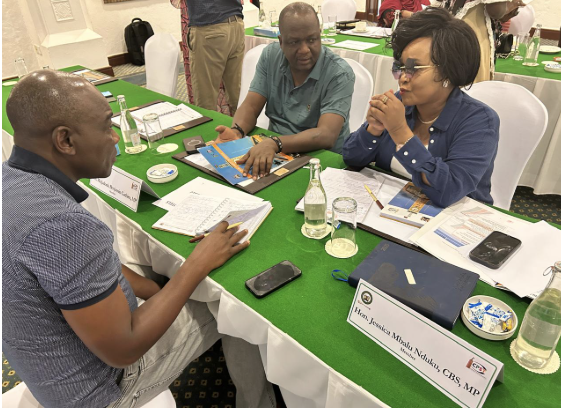
 Members of Constitutional Implementation Oversight Committee during a meeting to review hurdles facing constitutional commissions, independent offices/HANDOUT
Members of Constitutional Implementation Oversight Committee during a meeting to review hurdles facing constitutional commissions, independent offices/HANDOUTA House committee has embarked on a comprehensive review of mandates, constraints, and operational hurdles facing constitutional commissions and independent offices.
The move by Constitutional Implementation Oversight Committee (CIOC) chaired by Karemba Muchangi is aimed at bolstering good governance and reinforcing accountability structures across the country.
“While these bodies are independent and free from external control, the committee emphasises that they must still function within the confines of the Constitution and the laws that establish them,” noted Muchangi.
Among the institutions that featured prominently in the discussions on Wednesday were the National Land Commission (NLC) and the Ethics and Anti-Corruption Commission (EACC).
Members reflected on the persistent tensions between the NLC and the Ministry of Lands—particularly regarding administrative access and the enforcement of statutory mandates.
It was established that previously tension existed as a result of Parliament declining to extend the NLC’s role in addressing historical land injustices. The Supreme Court has since weighed in, affirming that the NLC’s authority stems from both the Constitution and enabling legislation.
However, it was further noted that amendments to the Land Act have significantly reshaped some of its responsibilities, prompting further debate on the scope and impact of such legislative changes.
The review also looked into the effects of leadership transitions on institutional performance.
Some legislative amendments, the committee noted, have either strengthened or diluted the effectiveness of these institutions over time.
Oversight mechanisms were also on the table, including Parliament’s constitutional mandate under Article 94 to oversee these bodies and amend their enabling laws.
While this is crucial for accountability, members warned that some amendments might inadvertently weaken the autonomy and effectiveness of constitutional commissions and independent offices.
“The Committee will come up with a Criminal Investigators Bill that will provide guidelines on how to conduct criminal investigations,” said Suba South MP Caroli Omondi, reinforcing the committee’s intent to clarify operational procedures and safeguard institutional integrity.
Judicial oversight also featured in the discussion, with members acknowledging that constitutional commissions and independent offices decisions remain subject to review and appeal, providing a necessary layer of checks and balances.
Committee members stressed the importance of using constitutional commissions and independent offices -generated reports to drive civic education and improve public accountability.
They also advocated for transparent, Parliament-approved funding models to ensure the financial independence and long-term viability of these institutions.
The CIOC reaffirmed its commitment to safeguarding the independence, efficiency, and transparency of constitutional bodies.
Members called for stronger legislative frameworks, heightened public awareness, and sufficient funding to ensure that constitutional commissions and independent offices remain effective champions of accountability, good governance, and the rule of law.
The committee further proposed several key interventions including reviewing Standing Orders to formally bring constitutional commissions and independent offices under CIOC's oversight mandate.









